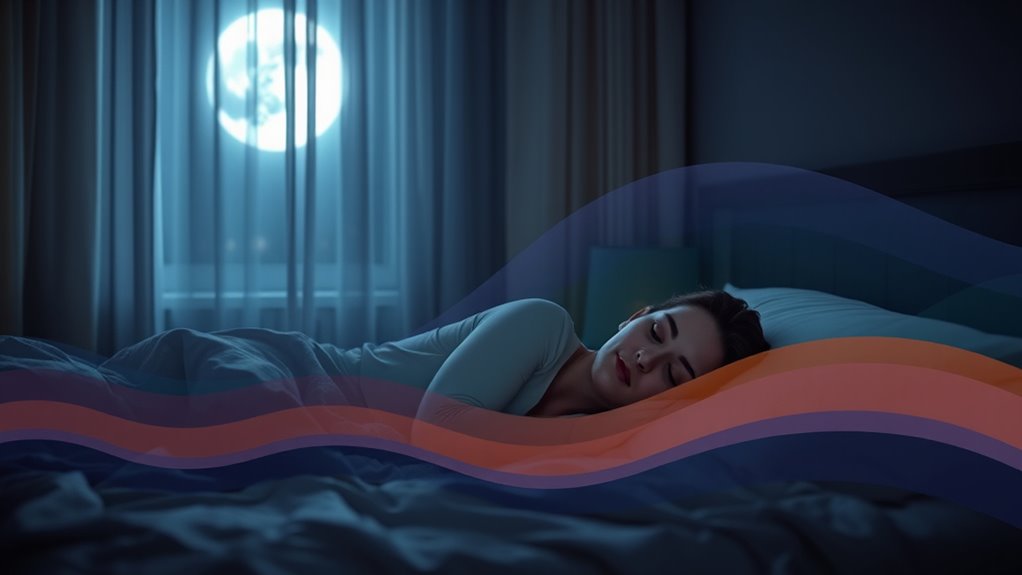Sleep occurs in cycles lasting about 90 to 120 minutes, including REM, deep sleep, and light sleep stages. During REM, your brain becomes active, dreams are vivid, and your body relaxes to prevent acting out those dreams. Deep sleep helps your body recover and remove toxins, while light sleep supports emotional stability. Understanding these stages can improve your sleep quality—stay with us to learn more about optimizing your rest and health.
Key Takeaways
- Sleep cycles last about 90 to 120 minutes, shifting through light, deep, and REM sleep stages.
- REM sleep features brain activity similar to wakefulness, supporting vivid dreams and memory processing.
- Deep sleep promotes physical and mental restoration, toxin removal, and brain recovery.
- Light sleep maintains emotional stability and prepares the body for deeper sleep stages.
- Proper progression through all sleep stages is essential for overall health, memory, and emotional regulation.
The Cycles of Sleep: An Overview

Sleep occurs in repeated cycles, each lasting about 90 to 120 minutes, during which your brain shifts through different stages. These cycles are essential for proper sleep cycle regulation, ensuring your body rests and recovers effectively. As you progress through each cycle, you’ll experience varying levels of light sleep, deep sleep, and REM sleep. Dream recall is often linked to these cycles, especially when waking during or right after REM stages, making dreams more memorable. Understanding these cycles helps you recognize how sleep quality can fluctuate throughout the night. Consistent sleep patterns support the regulation of these cycles, leading to better overall rest and increased chances of recalling your dreams. Mastering sleep cycle regulation is key to optimizing your sleep health. Additionally, factors such as sleep stages are influenced by overall health, lifestyle, and sleep environment, which can impact the quality and duration of each stage. For example, the contrast ratio in sleep environments, such as lighting, can affect sleep quality and the progression through different sleep stages.
The Role and Characteristics of REM Sleep

During the sleep cycle, REM sleep stands out as a particularly dynamic and essential stage. It’s when your brain activity ramps up, closely resembling wakefulness, which supports critical neurological functions. This stage is fundamental for memory consolidation and emotional regulation. You’re more likely to experience vivid dreams during REM, and that’s when dream recall becomes most vivid and frequent. REM sleep also plays a key role in processing information and clearing waste from brain cells. Your muscles are mostly paralyzed, preventing you from acting out dreams. As you cycle through sleep stages, REM periods lengthen, emphasizing its importance. Additionally, understanding the security measures involved in payment systems can help protect this vital stage of brain health. Recognizing the neuroprotective effects of sleep underscores how REM sleep contributes to overall brain health and resilience. Incorporating sound design techniques such as ambient sounds can influence sleep quality by creating a calming environment that promotes longer REM periods. Employing AI security technologies in sleep research can enhance data protection and ensure participant privacy during studies. Understanding REM’s role helps highlight how it keeps your brain healthy, alert, and capable of learning new skills.
The Importance of Deep and Light Sleep Stages

Deep and light sleep stages are crucial for restoring your body and mind. During these phases, your brain undergoes essential processes like brain restoration and memory consolidation, which help you learn and retain information. Deep sleep, in particular, promotes physical recovery and clears toxins from your brain, enhancing overall mental clarity. Light sleep prepares you for deeper stages and maintains emotional stability. Understanding sleep cycles can further optimize your rest quality by helping you recognize the importance of each stage. Additionally, recent advancements in AI-powered sleep tracking are providing more accurate insights into these stages, enabling personalized sleep improvements. Recognizing the sleep cycle can help you better plan your sleep schedule and improve overall health. Here’s a quick look at their functions:
| Sleep Stage | Key Benefits |
|---|---|
| Deep Sleep | Brain restoration, toxin removal |
| Light Sleep | Memory consolidation, emotional regulation |
Understanding these stages underscores their importance for your health. Prioritizing sufficient sleep ensures your brain functions at its best and your body recovers effectively.
Frequently Asked Questions
How Do Sleep Stages Affect Memory Consolidation?
Sleep stages play a key role in memory consolidation, affecting how well your brain processes and stores information. When you get good sleep quality, your brain effectively consolidates memories, especially during REM and deep sleep. Poor sleep can disrupt memory processing, making it harder to recall learned information. To boost memory, prioritize consistent, quality sleep, ensuring your brain has enough time in each stage for ideal memory consolidation.
Can Sleep Stages Vary Significantly Between Individuals?
Think of sleep stages like fingerprints—unique to each person. Sleep stage variability shows that individual differences influence how much time you spend in REM, deep, or light sleep. Some people naturally cycle faster or slower through stages, affecting rest quality and recovery. So, yes, sleep stages can vary considerably between individuals, making personalized sleep patterns essential for understanding your own sleep health and optimizing your rest.
What Factors Influence the Duration of Each Sleep Stage?
You might notice that the duration of each sleep stage varies based on factors like your Circadian rhythms and sleep environment. Your body’s internal clock influences when and how long you stay in each stage. A comfortable sleep environment, free of disruptions, helps maintain healthy sleep patterns. Stress, lifestyle, and overall health also play roles, affecting how your sleep stages progress throughout the night.
How Do Sleep Disorders Disrupt Normal Sleep Cycles?
Did you know that nearly 1 in 15 adults suffer from sleep disorders? They can markedly disrupt your sleep cycles, leading to fragmented sleep and reduced restorative stages. Conditions like sleep apnea cause brief awakenings, while restless legs syndrome makes it hard to stay in deep sleep. These disruptions decrease overall sleep quality, leaving you tired and affecting your health and daily functioning. Recognizing and treating these issues helps restore healthy sleep patterns.
Are There Ways to Enhance Specific Sleep Stages Naturally?
You can naturally enhance your sleep cycle and improve sleep quality by maintaining a consistent sleep schedule, avoiding caffeine and screens before bed, and creating a relaxing bedtime routine. Regular exercise also promotes better sleep stages, especially deep sleep and REM. Ensuring a comfortable sleep environment and managing stress are key. These habits help your body cycle through sleep stages more efficiently, leading to more restorative sleep and better overall sleep quality.
Conclusion
Now that you understand sleep’s secret dance of REM, deep, and light stages, think of your night as a symphony, each phase a vital note. Embrace these cycles like a wise navigator steering through a starry sky, knowing each one fuels your body’s renewal and dreams. By honoring your sleep stages, you open the treasure chest of restorative power, waking refreshed, ready to conquer tomorrow’s adventures with energy and clarity. Sleep truly is your nightly voyage to renewal.









